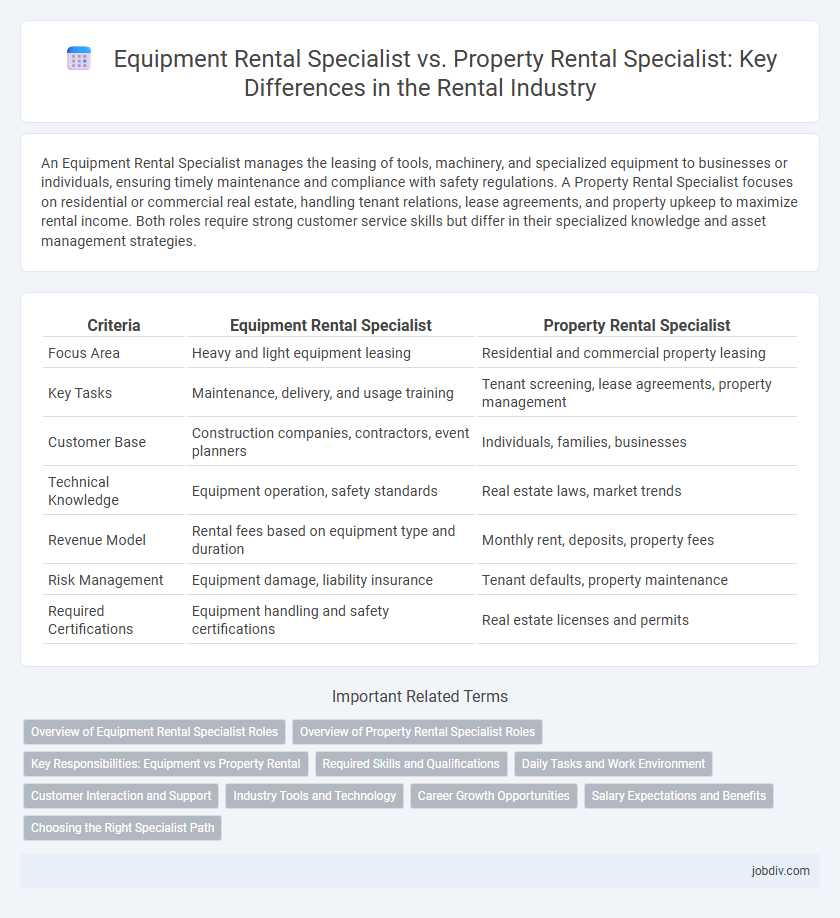An Equipment Rental Specialist manages the leasing of tools, machinery, and specialized equipment to businesses or individuals, ensuring timely maintenance and compliance with safety regulations. A Property Rental Specialist focuses on residential or commercial real estate, handling tenant relations, lease agreements, and property upkeep to maximize rental income. Both roles require strong customer service skills but differ in their specialized knowledge and asset management strategies.
Table of Comparison
| Criteria | Equipment Rental Specialist | Property Rental Specialist |
|---|---|---|
| Focus Area | Heavy and light equipment leasing | Residential and commercial property leasing |
| Key Tasks | Maintenance, delivery, and usage training | Tenant screening, lease agreements, property management |
| Customer Base | Construction companies, contractors, event planners | Individuals, families, businesses |
| Technical Knowledge | Equipment operation, safety standards | Real estate laws, market trends |
| Revenue Model | Rental fees based on equipment type and duration | Monthly rent, deposits, property fees |
| Risk Management | Equipment damage, liability insurance | Tenant defaults, property maintenance |
| Required Certifications | Equipment handling and safety certifications | Real estate licenses and permits |
Overview of Equipment Rental Specialist Roles
Equipment Rental Specialists manage the leasing of tools, machinery, and technical equipment, ensuring clients receive the proper gear for construction, events, or industrial projects. Their responsibilities include inventory management, equipment maintenance scheduling, and advising customers on suitable equipment based on project requirements. Proficiency in equipment operation, safety standards, and rental contract coordination distinguishes this role from Property Rental Specialists, who focus primarily on real estate leasing and tenant management.
Overview of Property Rental Specialist Roles
Property Rental Specialists manage residential and commercial leasing processes, including tenant screening, lease agreement preparation, and property inspections. Their expertise lies in maximizing property occupancy rates while ensuring compliance with local housing laws and regulations. They serve as the key liaison between property owners and tenants, resolving disputes and coordinating maintenance to maintain property value.
Key Responsibilities: Equipment vs Property Rental
Equipment Rental Specialists manage the inventory, maintenance, and timely delivery of machinery and tools, ensuring operational functionality and customer satisfaction. Property Rental Specialists handle lease agreements, tenant screenings, and property inspections to maximize occupancy and maintain asset value. Both roles require strong coordination skills but differ primarily in asset type and client interaction focus within the rental industry.
Required Skills and Qualifications
Equipment Rental Specialists require technical knowledge of machinery operation, maintenance, and safety protocols, along with strong inventory management and customer service skills. Property Rental Specialists need expertise in real estate laws, tenant screening, lease negotiation, and property management software. Both roles demand excellent communication, organizational abilities, and a keen understanding of market trends to optimize rental processes effectively.
Daily Tasks and Work Environment
Equipment Rental Specialists manage the inventory, maintenance, and delivery of tools, machinery, and vehicles, ensuring timely availability and proper functioning for clients. Property Rental Specialists focus on leasing residential or commercial spaces, conducting property showings, handling tenant inquiries, and managing lease agreements within real estate environments. Equipment specialists typically work in warehouses or rental facilities with hands-on technical tasks, while property specialists operate primarily in office settings and on-site property visits.
Customer Interaction and Support
Equipment Rental Specialists manage interactions by providing detailed product knowledge, usage instructions, and addressing technical issues to ensure customer satisfaction. Property Rental Specialists focus on client needs by guiding them through lease agreements, property tours, and resolving tenancy concerns efficiently. Both roles prioritize clear communication and personalized support to enhance the overall rental experience.
Industry Tools and Technology
Equipment Rental Specialists leverage advanced inventory management software, GPS tracking systems, and telematics to optimize asset utilization and streamline maintenance scheduling. Property Rental Specialists utilize digital lease management platforms, virtual tour technology, and automated tenant communication tools to enhance tenant experience and operational efficiency. Both roles increasingly rely on industry-specific technology to drive productivity and improve service delivery in their respective rental markets.
Career Growth Opportunities
Equipment Rental Specialists often experience rapid career growth due to the increasing demand for construction and industrial machinery, with opportunities to advance into managerial roles or technical consulting. Property Rental Specialists tend to benefit from steady career progression through property management, leasing, and real estate investment advisory positions in residential and commercial markets. Both careers offer pathways to specialization, but Equipment Rental Specialists may see faster advancement in high-demand sectors like infrastructure development.
Salary Expectations and Benefits
Equipment rental specialists typically earn between $40,000 and $60,000 annually, with benefits including health insurance, paid time off, and manufacturer training programs. Property rental specialists often have salaries ranging from $35,000 to $55,000, accompanied by commissions, housing allowances, and flexible work schedules. Salary expectations for both roles vary based on location, experience, and company size, with equipment rental often offering more technical training benefits.
Choosing the Right Specialist Path
Choosing the right specialist path between equipment rental and property rental hinges on understanding the unique market demands and operational expertise each requires. Equipment rental specialists excel in managing inventory, maintenance schedules, and technical specifications for machinery and tools, while property rental specialists focus on tenant management, lease agreements, and property maintenance. Aligning your skills with industry needs ensures success, whether optimizing asset utilization in construction or maximizing occupancy rates in real estate.
Equipment Rental Specialist vs Property Rental Specialist Infographic

 jobdiv.com
jobdiv.com